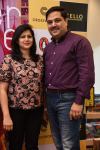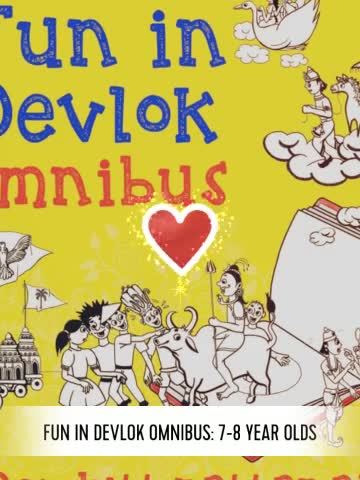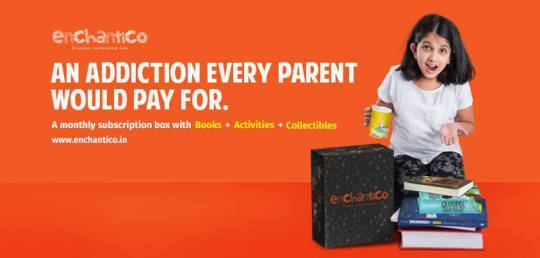Ravi Subramanian's Blog, page 2
March 12, 2017
e-books vs paper books
Here is a blog I wrote for www.enchantico.in ; India’s first book subscription box for kids.

Click image to go to www.enchantico.in
The eBooks vs Paper books fight has been going on for some time now. Unfortunately, I fail to understand what the row is about!
To digress a little… Years ago, a long distance relationship would mean that we couldn’t talk to or meet our near-and- dear ones for months. With the invention of telephones and mobile-phones, our lives were simplified. And then a digital revolution happened. Applications like Whatsapp, FaceTime and Snapchat changed the world as we know it. We could easily connect with people sitting in far off places – see them, hear them, feel them as if they were with us.
But did that mean we stopped meeting people in the physical world? Did we stop going out on dates with our better-halves and instead date digitally from home? Can a video call truly replace meeting someone in real life? Digitalization was meant to ease our lives, not as a way of life. So… is it any different when we are talking about digitalization of books?
Today, toddlers know how to operate our mobiles and tablets, maybe better than some of us! Watching videos on YouTube and downloading & playing games from the App Store is a piece of cake for them. Our childhood memories are full of running around and playing games like hide-and-seek; our kids are making memories of playing Candy Crush and Temple Run! At a time like this, do we really want to even digitalize books for them?
Can an eBook truly replace a traditional Paper book? Even though the influence and market of eBooks is growing, can we, or rather should we disregard Paper books?
Here are 6 reasons why I believe there is no comparison between the two:
1. Experience matters

What is it that you want for your child? Do you want him to read books or do you want your child to fall in love with the experience of reading?
The touch of a page, the smell of a book, the anticipation of turning a page, the excitement of using the new bookmark… these are all experiences that add to the pleasure of reading, pleasures that only a Paper book can bestow you with.
2. Possessions – Prized or otherwise

If you are an avid reader, you surely have those few books that you just can’t do away with. They are old, and they are battered, and you no more get time to read them because of your busy lives. But you still have them – a part of your bookshelf that serves as a beautiful reminder.
Do you think your child will be able to enjoy such moments of gratification and fulfilment with eBooks? Shouldn’t he have a physical reminder of his intellectual journey? And, who is to even guarantee that the eBooks that he is reading today in a Kindle or a Tablet might even be readable a few years down the line! The formats might be as obsolete as a Floppy Disk or a CD!
3. Hitch with Memory

And it’s not just all about fun and pleasure. Studies have proven that individuals reading an eBook are more likely to not recall the details as compared to their counterparts reading the traditional printed books.
If all you want to give your child is a fun-time then it might be alright. However, if you want him to remember the content, an eBook spells bad news.
4. Give and Take

Remember those times when someone gave you a book and said “Read it and you’ll know”? That feeling of sharing a book… how can your child really experience it with an eBook?
I agree there are ways to share eBooks. But sharing it over Bluetooth or Email just does in any way give either one of you the same pleasure.
5. Note-making

Remember all the scribbling in the margins, underlining or highlighting we used to do to make notes for ourselves? Not to forget those dog-ears! You can only enjoy these advantages with a Paper Book. Though eBooks allow you to digitally mark or make notes, it just isn’t the same. Physically making notes boosts our cognitive abilities and helps us to understand and recall details. There is not much use of all the reading your child would do if he wouldn’t be able to recall the details, would it?
6. Health is the biggest wealth

Reading an eBook from a device that emits light certainly isn’t the healthiest way of reading a book. And though Kindle has brilliantly solved this problem, it still interferes with the sleep and overall health of your child.
Having advocated Paper books, I would also like to point out that eBooks is a boon. If you have fortunately been able to inculcate the reading habit in your child, and if he cannot travel without having a few books at his disposal, an eBook reader might just be the answer to your requirement of traveling light.
To conclude, I would like to say that as long as we treat eBooks as a temporary replacement of Paper books, it works just fine!

January 23, 2017
Only you can lead yourself to where you want to go
It was sometime in 2001 that I got promoted from Assistant VP to Vice President . At that time, I was managing the mortgage business in North India for Citibank. Even after my promotion, I continued doing the same role — only the title changed. All my earlier promotions had come with a change in my role and responsibilities.
One of my seniors, on one of his visits to Delhi, took me out for dinner to celebrate my move from AVP to VP. Vice presidents were a rare breed those days, so becoming one did call for a celebration. I took the opportunity and decided to voice my concern. “What next? Does the organisation have a plan for me?”
“As in?”
“Now that I have been promoted, will I continue doing the mortgage role for another two years or is there any plan to move me to some other role?” I asked.
He smiled. I guess my anxiety was obvious . “Do you know Ravi, who all love you?” He asked. I had a blank reaction to this question .
“Remember” , he continued, “Your family and parents are the only ones who love you. They will do things selflessly for you. Not only that, they will always have your best interests in mind. Everyone else will only do what suits them.”
“But what’s the relevance?” I was a bit confused.
“If you think anyone is managing your career for you, you are mistaken. Others will only do what fits in their scheme of things and not necessarily what is good for you. Very few people will put your interests before themselves.”
I didn’t take long to understand what he was saying. The cold, hard truth is: one has to look after oneself. No one else will. This is the reality of corporate life. Bosses, human resources teams, mentors and godfathers, among others, will come and tell you they are really looking out for your rocking future.
Don’t get fooled. They will only take you where they want to lead you. They will channelise your career in a direction that suits them (and not necessarily suit you). Your career is up to you… and you alone. “Be clear in your mind as to where you want to go, what you want to do, what you want to achieve, what kind of experience you need to specifically get to reach your goal, and what your broad career aspirations are. And articulate it to the right people. If you want a specific experience, ask for it.
“Better still, if you can, go grab it,”One of my colleagues, who is now the HR head at a consulting firm said. In one of those candid conversations, he said, “Don’t expect that you will be promoted because you deserve it — it is unlikely that anyone is keeping track.”
Generally, things don’t come to people who do not ask for them. You give yourself a better chance to be in the reckoning if you stake claim for anything that you think should be rightfully yours. This, though, does not mean you should be combative, aggressive, rude or disrespectful. It just means do not be naive when it comes to managing your career.That brief conversation with a senior left me with an everlasting imprint. In spite of what anyone says, you are on your own. In the battlefield that many refer to as the workplace, you need to take charge. If you need to progress, to do well in your career, to be recognised as a good leader of men and resources, you need to stand up and demand what you want. You may not always end up being successful .
Just remember one thing: If you ask for anything, you give yourself a better chance of getting it. Career is no different.
This piece is from my column in Economic Times and was first published in the print version of Economic Times dated Jan 24th 2012

December 29, 2016
Weird things authors do…!
Having spent close to a decade in the publishing industry, I have been witness to a number of crazy things authors do (some of them, even I do). Authors are really crazy people. How else do you justify anyone sitting hours in front of a screen typing away? How else do you justify someone spending hours away from family, at times doing nothing, but just staring into wilderness? How else do you explain someone haggling with a vegetable vendor for five rupees but throwing away precious hours in the quest to find the perfect way to kill someone? Writing does not pay, except for a few. I have done multiple blogs on the lack of commercial wisdom in taking up writing for a living. Yet everyone wants to get published. Yet everyone wants to write that bestseller (well, just for the record… you don’t write a bestseller… what you write goes on to become a bestseller.). Yet everyone wants to see his or her book on the bookshelf. His or her name on the cover. This is one obsession that can only be justified if it can be put down to a crazy, weird personality disorder that is inherent in authors.
Lets look at a few crazy things authors do. This list is by no means exhaustive.
Authors Google themselves excessively – to the point that calling it an OCD may not be incorrect. Not only do they Google their names or titles of their books, they also Google for variations in the spellings of their names. Subramanian can be wrongly spelt as Subramaniam or Subramanium, Ravinder can be Ravindra or Raveendra, Preeti can be Priti, Dutta can be Datta, Anita an be Aneeta or Anitha too, depending on which part of the country you come from. Authors don’t want to miss anything that is said – good or bad about their book (or about them). Not only on google, they also search for mentions on Twitter and all over social media. Have you ever been surprised when you got a response from the author on your tweet about the author or the book, specially when you never marked him or her in the first place.
(* the names mentioned above are just for representation.)
Most authors lie about advances and book sales : When I was a kid, I had heard a saying – Never ask a woman her age and a man his salary. (Of course those were days when such sexist remarks were the order of the day). Today you can add a third leg to this … Never ask an author his sales figures. You will never get a right answer. If he doesn’t tell you or says that he hasn’t got the report from the publisher, then you know – he doesn’t want to tell you the numbers. In the remote case that he shares the numbers with you then you can safely bet that the numbers are not accurate but significantly padded. How padded? Well depends on the authors conscience. A heavy conscience is never a result of heavily padded overstated numbers in the world of books.
Some Authors buy their own books – If film stars / distributors block seats at multiplexes to help prop up the box office collections why not authors? Buying a book helps prop it up the bestseller lists. Many authors clandestinely do this. I think this is like popping a pill before a medical check up so that the medical test results come out good. Who are we fooling? We are only fooling ourselves. We are only losing the respect we have for ourselves. At least one book that has been in the Nielsen top ten in the last six months has been propped up in this manner. An author in the recent past put up a FB post saying 50K copies sold in 75 days and the next post was 70K copies sold in 85 days… and a few days later said 100K copies sold in 100 days – pretty much like a Sehwag innings.. 75 days for the first fifty and twenty five for the second. The industry suspects that the author buys own books through a network of people. Yet no one talks about it.
Secretly stalk media: Many authors stalk journalists. A journalist once confided to me in private that the day she covered an author for the first time in her life, she got seventeen mails and twenty six Facebook friend requests from other authors wanting to send her their books. Many authors have an excel worksheet, of media personnel who have covered other authors and for which newspaper/magazine. Helps them reach out when they need a little bit of ego massage.
Don’t speak the truth on public forum: One must not trust most of what authors tell you on a public forum: Authors are more open on one on one chat. Not on a public forum. When you hear them speak at festivals or any other event, they largely say things, which are politically correct, or stuff, which the audience wants to hear. Always listen to them ..but do what you want to do.
Remember there are no rules for writing a book. Do what you are comfortable with. There is no right or wrong. Eventually whatever sails your boat will take you to the destination. And what sails your boat may be very different from what sails someone else’s.

December 18, 2016
Why I counted my blessings and thanked God for 2016…


As I reflect on the year gone by, I wonder what makes a year a great year. What makes you feel satisfied with the year that is almost coming to an end? When I think about it, it strikes me that as a parents of a girl who turned seventeen a week and half ago, our assessment of a year gone by often revolves around the child. Around how the year has been for her. As Dharini and me were discussing this on a Sunday evening, the realisation dawned that 2016 has been possibly the best year ever for us. And almost everything that has given us joy this year has had to do with our daughter, Anusha. Am just penning down a few things that come to mind right away (not in any particular order)
Anusha started the year with the most stressful exam of her life (till date) – the 10th ICSE. She worked really hard for that, and her efforts paid off. She got a creditable 97.2%.
She got admission to Dhirubhai Ambani International School – the No.1 ranked IB school in the country, for her XI and XII. As the year progressed, she settled comfortably into the new environment. Most importantly she has learnt the value of relationships and now she cherishes her friendship with her friends from her old school, as she goes about making new friends at DAIS.
She spent three weeks in Providence USA, pushing a summer internship at Brown University, her first time away from home for that long. While those three weeks were painful for us as parents, it was necessary because loving someone is as much about holding on to them, as it is about letting them go. I felt that staying alone in an alien territory is a learning every parent must give their child. I noticed a huge huge positive change in Anusha after the three weeks Brown University stint.
Her second book NEVER GONE, was published by Penguin this year. The book has been appreciated by everyone who has read it. (Never Gone on Amazon)
She has her own Weekly column in DNA now. Click here for Anusha’s column in DNA
She has been in the best of health throughout the year.
And most importantly she is happy with the way her life has progressed this year
As a parent nothing gives you more joy than seeing your children do well in life. And for me (as it does for every other parent) this is possibly the ONLY yardstick for success. Only path to happiness.
Time to count ones blessings, and thank God for a wonderful 2016.

November 4, 2016
Once Upon a time! What the Amazon acquisition of Westland says about our Publishing Industry…
neral
Excitement of this kind is quite rare in the publishing industry. The last came a few years ago when Random House took over Penguin. And now this Amazon buyout of Westland has given the industry an interesting conversation beginner. Amazon had signaled their intent in February this year when they acquired minority stake in Westland from Tata-Trent. It was known at that time itself that Amazon was not in this deal for a minority stake. Those who read the deal closely knew that at some point in time, Amazon would take over the company. That it would happen so soon (within six months of the initial acquisition) no one really anticipated.
The acquisition can only be good for Westland. They move from being owned by Tata Trent – someone who can at best be called “a reluctant owner” – to someone who would want to grow Westland into a premier publisher, maybe one of the largest in India. Westland will now get the investments that they have always had to fight for, often in vain. And they will get the muscle to compete in the market and dominate. Till now they have dominated because they have had big names publishing with them. Now they will dominate because they will have scale, money, publishing bandwidth and most importantly Amazonian muscle power. However the fact that a publishing house that boasts of some of the biggest names in the industry should get sold twice in a matter of a few years, is a question in itself.
Whenever such a high profile acquisition happens in any industry, the industry should introspect and do some soul searching. Ask itself some questions. No one is asking those in the publishing world today. Maybe they are, but these are points that are seldom talked about. For they involve commerce. Money. And talking blatantly about money in publishing is ‘just not done”.
Is publishing a business? Well, for some, it surely is. For the writer it may be an art (or craft as some would say), but for the publisher it is surely a business. No one is in it for love and fresh air. Yet, in publishing, no one makes ‘enough’ money. They key word being ‘enough’. Publishers keep complaining that they don’t have money for advances, marketing spend, acquiring new titles etc. etc.. Authors are the quintessential bottom of the pyramid category (at least in their minds, they are). Distributors never stop cribbing. Bookstores have gone step further and downed shutters. So where is all the money going. First of all, is there as much money as people make out to be. Time to do a reality check.
Any business becomes attractive if
there is an opportunity to scale up
the business is profitable
the valuations in this space are attractive and
the business provides some other intangible benefits like recognition, stature, status etc. to the promoters.
Lets see how the trade publishing (fiction/non-fiction English language publishing) in India stacks up on all these.
Scale
In a country of 1.2 Billion people, one would expect serious scale. India has one of the largest English speaking populations in the world. Hence it is not unreasonable to expect publishing to be a big business. When we talk of publishing topline in India, a lot of numbers are thrown around. Rough estimates put the total turnover of the Indian publishing Industry at 26000 Crores. Sadly that is a very misleading number for most of it pertains to academic books / education related publishing. Publishing of education related books is an extremely fragmented (over 9000 publishers), low margin and corruption prone industry.
Trade publishing (Fiction / Non-fiction / Non-Academic Publishing) in English, on the other hand, constitutes a minuscule portion of this. Big Daddy of trade publishing, Penguin Random House has a post merger top line of 190 Crores (or thereabouts). This includes all streams of revenue – local publishing, international publishing, distribution of other publishers books and door to door sales. The second biggest player, Harper Collins is at an estimated topline of 120 Crores. For Harper this even includes direct to school sales. And then there is a wide chasm. Hachette which is normally at around 30 Crores p.a topline is expected to close this year at 45 Crores, thanks to one book – Harry Potter and the Cursed Child.
Rupa & Aleph combine at 35-40 Crores (thanks to Chetan Bhagat) is next and then comes Westland at 20 Crores. Pan, Bloomsbury, Scholastic, Roli books, Shrishti etc. are all below 20 crores in topline. (These numbers are purely guesstimates based on industry interactions)
Nielsen Quarterly report pegs the book sales in the July-Sept 2016 Qtr ar Rs 144 Crores. This is what consumers/readers paid for the books sold in this period. If we assume a uniform sales throughout the year and extrapolate this quarterly sales of 144 Cr., it would translate to an Annual sales figure of 576 Crores for English language books. Nielsen numbers represent only 50% of the market. So a rough estimate of total sales would be 1152 Crores.
This 1150 Crores, which the customer pays gets shared between the retailer, distributor and the publisher. Typically 2/3rd of this goes towards the publishers topline. All this translates to the Publishing Industry topline of ~ 750 Crores.
A trade Publishing (english language fiction/non-fiction, non-educational books) market of USD 110 Million is hardly anything to write home about. Have you ever wondered why bestselling International authors (except maybe Jeffrey Archer) don’t have India on their book promotion circuit. The answer lies in scale – or lack of it.
Is there an opportunity to scale up? On paper…. YES. But in reality, the needle has not moved much over the years. Book sales have stagnated over the years.
Profitability
Publishers lose money on most books published in India. 20% of the books published pay for the 80% of the books that don’t make money. Well this is true for most industries. But the key difference in Publishing is that the 20% of the books that make money, don’t make so much money that the publishers end up rolling in gold.
For most multinational publishers, and even some of the local ones, a high percentage of revenues (at times even higher than 70%) are based on international imports. Losses on account of forex fluctuation often comes into play. The high costs of distribution and marketing of books eats into the profitability. And what kills it is the fact that the publishers never get paid on time. They get ther payment often six months after the books have been shipped to the distributors. And invariably these days books are sold to distributors on a returnable basis. Which means that after six months, the distributor has the right to return his unsold stock and only pay for what he has managed to sell. And then of course there are inventory carrying costs, logistics, printing costs etc, which are becoming expensive by the day. And we are not even talking of fixed costs, office rentals, staffing costs etc etc.
Pricing of books have also not kept pace with the rising expenses. When my first book If God was a Banker came out in 2007, it was priced at 195 and the publisher topline was roughly 137 a book. (Discounts to retailers were quite reasonable those days). Today the book is priced at Rs. 295 and the publisher revenue for every book sold is Rs. 148 (approx). An increase of 11 Rupees a book does not even cover inflation.
Real profit numbers aren’t that high and its a cash out business for most part for publishers. End of the day, a publisher typically ends up making 6-8% of his revenue as profits. Lets see how that translates for the big four of publishing
Publisher
Topline
Net Profits
PRH
190 Crores
15-18 Crores
Harper Collins
150 Crores
12-14 Crores
Rupa
35 Crores
3-4 Crores
Westland
20 Crores
1.5-2 Crores
*Rupa’s Net profit % is expected to be higher on account of lower costs
To put things in perspective, Penguin Books came to India in 1987, Harper Collins in its various forms has existed for long in India. Rupa just completed its 80th year in existence and Westland started in 1962 (as East West Publications.. though their serious foray into publishing started some 11-12 years ago). If after all these years in existence, this is the kind of money the publishers make, it does tell a story.
The money that SRK or Salman Khan make in one movie is more than what the top five trade publishers put together make in one year. Well, the story is tragic.
The only publishers who seem to be making money these days, are the publishers who are into self publishing…most of whom (not all) are just glorified printers. For the sake of this post, I am ignoring the self publishing industry.
Valuations
Well, this is where everything culminates. How can one expect high valuations in an industry that has low profitability and limited opportunity to scale up. Amazon bought Westland for Rs 40 Crores (inclusive of amount paid in February 2016). That translates to a valuation of 2 times topline. Isn’t that a pittance for a company that is over five decades in business and boasts of publishing some of the biggest authors in India.
If we were to apply the 2X valuation yardstick to other publishers ; a PRH would be worth ~400 Crores, Harper ~300 Crores and RUPA ~70 Crores.
For businesses which are as old as these publishing houses are, for an industry which brings together the intellectual powerhouse of the nation, for an industry that defines and documents cultures, this is a pittance.
This low growth and lack of valuation in this industry brings to fore another challenge. The industry does not attract investments. PE funds stay away from traditional publishing. Hence all growth has to be necessarily funded by internal accruals. Yes, in the past, there have been multiple investments by Everstone and IFC in S Chand & Co, but that is on the back of a solid Education Books publishing business. Juggernaut too, was started with the backing of Nandan Nilenkani and a few others, but I am sure they invested in Chiki Sarkar whose aura and reputation more than compensate for the less attractive publishing business. Lack of valuations are also forcing new players from staying away from this industry.
In any industry that does not attract new players, or investment, innovation takes a back seat. That is what is happening to our publishing industry today. (notwithstanding the efforts of Juggernaut)
Recognition
At least one publisher in private conversations has expressed the desire to walk away from this trade. The same publisher also expressed frustration at being unable to do so, for the business has given him an identity, a recognition, which any other trade would not give the publisher. This is a fact. Publishers enjoy a stature in society which professionals from other industries don’t have. They enjoy access to powerful people, celebrities, and wield an influence which not many can boast of. This can be addictive. But this can’t be the only reason why anyone remains in publishing.
Publishing as a business cannot justify its existence if one were to look at pure commercials. There are better ways for businesses to make the money that publishing does. There are easier ways to build valuations much higher than those prevalent in the publishing business.
I agree that publishing gives wings to a passion. It supports an art which is divine in more ways than one. It helps define cultures. It helps generations broaden their perspectives and live life differently. It employs a number of people directly and indirectly and hence supports society. All of these can’t be measured in terms of money alone. But somewhere deep down, I feel that unless we figure out a way to make the entire publishing eco-system richer we are fighting a losing battle.
All this boils down eventually to one number : Sales. If we figure out a means to increase revenue for the publisher. Everything will fall in place. Profit numbers will go up, Valuation of publishing houses will go up, more investors will flock to this space, publishing houses will be able to pay more to attract talent, create more job opportunities, publish more books, there will be more authors, more people will take to writing, bookstores will be back in business… overall the ecosystem will benefit. Wouldn’t that be wonderful. And the only way to do this is to get more people to buy books and read. Enlisting the support of authors and asking them to champion the cause of reading may not be a bad idea.
Publishers are very happy to support in case anyone has a good idea. My own experience in this has been fabulous. A few months back, I along with a couple of like minded friends went to the publishers with one such initiative – Enchantico (www.enchantico.in) …. the first book subscription box for kids in India. It is an initiative very close to my heart, aimed at getting young children in the age group of 5-12 yrs to read. An initiative aimed at putting the fun back into reading. An initiative aimed at weaning kids away from gadgets and rekindling their interest in books and reading. When I went to publishers with this initiative, almost all of them jumped at the idea and have supported it whole heartedly. We have reached a level where we put a smile on the faces of hundreds of children every month. The smile that children have on their faces when they read interesting books is a huge motivator. I hope and pray that these young children who take to reading, or further their reading interests through Enchantico, continue this passion throughout their life.
We need hundreds of such initiatives to get more people to read. There is no other solution to the problems that plague the publishing business.
The price at which Amazon acquired Westland has brought this issue to the fore. What we lack in India is not quality writing, is not talent, is not intent, is not ability…. it is Scale. And till we fix it, nothing will and nothing can change.
Lets just hope when people talk about the Indian trade publishing industry a few decades from now, they don’t begin by saying, “Once upon a time….”

October 24, 2016
Past life regression … interesting thought
 I was reading a book a few days back… Many Lives Many Masters by Dr Brian Weiss. At the end of it, I turned to Dharini and asked her if she believed in the concept of past life regression, and whether she would like to do it at some time. She turned around and told me that she was unsure. Undecided if she believed in it or not. But she was clear that she wouldn’t want to know about her past life. My obvious reaction was “Why?”.
I was reading a book a few days back… Many Lives Many Masters by Dr Brian Weiss. At the end of it, I turned to Dharini and asked her if she believed in the concept of past life regression, and whether she would like to do it at some time. She turned around and told me that she was unsure. Undecided if she believed in it or not. But she was clear that she wouldn’t want to know about her past life. My obvious reaction was “Why?”.
“What if you turn out to be my tormentor, in my previous life,” she said. “What will I think of you then?”
I didn’t have an answer for that… but then I got thinking. “What if it just turned out to be the reverse? What is she turned out to be my tormentor in my previous life? Will the guilt then change anything” I didn’t ask. I let the thought be.
I sure am going to be tormented for this post though.

September 17, 2016
To get your child to think out of the box, first get him/her inside the box : the ENCHANTICO box
What does your child need as he/she grows up to be someone who will make you proud ? The child needs the right friends, the right mentors, the right places to travel to, the right stimulants to his fertile mind. The child will also need something that will make him world ready. And if you think of what is that something that will give our children all of the above? Isn’t the answer simple ? Its books !
But hey, that isn’t that simple. With so many books and so little time, how do you ensure that you pick the right books for your child? While you can always go right with classics, there is so much of new literature coming up – it is very easy to get lost. That’s exactly where Enchantico comes in. Enchantico is a delightful box that comes with age-appropriate curated books delivered right at your door-step. Here’s how delight opens up as your child opens up the box:
A brain-bill served monthly: Enchantico is a subscription service that delivers two of the latest books in childrens literature plus activities and collectibles right at your doorstep – month after month. All yours for keeps.
Age appropriate and Curated: The Enchantico box doesn’t just have books, but books curated by some of the best minds in childrens literature. This means in a year, you will receive 24 of the best books released in the recent past. These books are meant for 4 different age groups – 5-6, 7-8, 9-10 and 11-12.
Readers to Leaders: The books are curated with a plan. To introduce your child to the best minds and authors in childrens literature. To develop their language, imagination, creativity, empathy and make them world-ready.
Books and More: Enchantico goes beyond books and also features activities based on books. Activities meant to engage and deepen their bond with literature. Also packed in are collectibles based on superheroes and characters your child is excited about.
The World of Enchantico: Enchantico is also in the process of creating a whole ecosystem for literature – A soon-to-be-launched digital platform and a series of literary events including an exciting childrens litfest – Litomania.
At the end of it, making sure that your child thinks out of the box, is entirely in your hands. Getting him or her into the world of Enchantico box is entirely in your hands too.
Gift your child an ENCHANTICO box today and see the kid transform from a reader to a leader. See him metamorphose into an out of the box thinker.
Here is a sneak preview of the books that went out to the Enchantico Subscribers in September. October promises to be even more exciting.
Click here to know more about enchantico and subscribe to the best gift that you could give your child – A gift for his future. www.enchantico.in
To see what Enchantico Box Subscribers got in August, see here : Enchantico August Box
Copy Credit : Sangram Surve


August 26, 2016
Enchantico : August Boxes
Here is a sneak peak into the Enchantico Boxes that were sent out to subscribers in August. Enchantico : The best gift for your child. You can order your own enchantico box here : www.enchantico.in
Enchantico box for age group : 5-6 Years 
Contents of the Enchantico August Box for Children aged 5-6
The blue eyed Mouse and the Green Eyed Mouse- Bob Gill
The Milk Moustache by Vikas Khanna
Author Cards for Vikas Khanna and Bob Gill
Apron with a white moustache stitched on it
Moustache shaped Silicon moulds
Recipe for making chocolate in the moulds
Children table mat with the book cover of Milk Moustache on it
Badge which says “Booked for Like”
“I can read everywhere”, Poem Postcard
Highlighter set in the form of a foot
Special Puffin Notebook
Personalised “I am your reading buddy – Enchantico” mug
Enchantico box for age group : 7-8 Years
Monster Garden by Jerry Pinto
The Shy Supergirl by Shabnam Minwala
Danny Dreadnaught Saves the World by Jonathan Emmett
Make Your own Superhero Mask and Armband Kit
Marvel Civil War Jigsaw
Badge which says “Booked for Life”
Reading of all books, Postcard
Author Cards of Shabnam Minwala, Jerry Pinto and Jonathan Emmett
Special Puffin Notebook
Personalised “I am your reading buddy – Enchantico” mug
Enchantico box for age group : 9-10
Grandpa’s Great Escape – David Walliams
Horrid high 2 – Payal Kapadia
Author cards for Payal Kapadia and David Walliams
Make your airplane kit with colours from Fevicryl, Glue and brushes
“Certified book Addict” badge
“Who will you meet in a good book” postcard
Exclusive Puffin Diary
Personalised “I am your reading buddy – Enchantico” mug
Enchantico box for age group : 11-12
Time traveling with a Hamster- Ross Welford
Murder most Unladylike – First Class Murder by Robin Stevens
Author cards for Ross Welford and Robin Stevens
Become a Detective kit in a pouch.
Hermoine’s Time Turner Unisex Necklace
Booked for Life Badge
“In the end” Postcard
Exclusive Puffin Diary
Personalised “I am your reading buddy – Enchantico” mug

For parents of children who read and also for those who don’t!
If there is one thing I am sincerely thankful to God for, it is the fact that my daughter Anusha is a voracious reader. I meet a lot of people who bemoan the fact that their children don’t read and they don’t know what to do to encourage the habit of reading in a child. Great leaders have often been seen to be voracious readers.
Let me lay out some facts (rather widely accepted opinion) here.(in no particular order)
If you force children to read, they will start hating it.
Put them in reading classes, it becomes curriculum. Anything that is curriculum, is uncool and is boring
Many children look at parents who read, as role models and develop the habit of reading. But if you as a parent, don’t read, then how does one nudge the child towards developing the habit of reading.
If the passion for reading is developed at a young age, it stays with you for life.
Parents often don’t know which book to buy for children and go by current trends.
Bookstores, sadly, don’t stock Children’s books the way they used to. A number of wonderful written books don’t even make it to the book shelves. Hence they never get seen and picked up.
A number of brilliant Indian authors who write for children, don’t get their place in the sun.
World over, Childrens books is one of the largest and fastest growing categories. In India, while it is growing, it is not growing at the same pace as the number of children who can read/write. In other words, there is growth in absolute numbers, but degrowth in terms of relative growth vis-a-vis the target market.
This has been one area I am passionate about and have always wanted to do something in this space. So I got together with a couple of other like minded friends (Sangram Surve who heads a marketing agency Think Why Not and his wife Shalini who is also a wonderfully creative mind) and Enchantico was born.
Enchantico is everything that the children books ecosystem in India lacks. Aimed at putting the fun back into reading for the kids. It presents books to children in a cool and fun manner so that they take to reading without any coercion. For those who do read, Enchantico provides them with exposure to specially curated age appropriate books that they would not have picked up in the normal course, thereby broadening their horizon and of course, their choices.
To become a member of the Enchantico ecosystem, you have to subscribe to it. 3, 6 and 12 month subscriptions to the Enchantico box are currently available. Once you pay the subscription fee, every month, on a pre decided date, your child will get an Enchantico box gift-wrapped and delivered at your doorstep. Each box will contain a minimum of two books, specially designed book related activities and a host of other cool collectibles that your child will love. The books are curated by a special team which is led by Lubaina Bandookwala, who is an institution in the world of childrens books. These books are curated from the domestic and international lists of all the key publishers. (over 50% of the books that we look at, you won’t even find in book stores – for book stores just don’t stock the entire range of childrens books). The activities that go into the box are designed by our in house team, keeping in mind the lead book in the box.
To see what went in our August Box, click here ENCHANTICO BOXES – AUGUST
We will also be building the entire ecosystem around the world of books and authors. Literature festivals special targeted at children, author interaction/talks in schools, publisher engagement, contests etc are just a few of the things that we plan to do, to get children to savour the world of books and reading.
The core objective of Enchantico though is to get Children to discover something new each time they get an Enchantico Box and to put the fun back into reading.
Am really thankful to the host of publishers who have come forward to support us in this initiative.
Together lets make the world a better and well read place.

August 11, 2016
How do we get our children to read?
Reposting a post from 2013… so relevant even today.
Yesterday I was asked a very interesting question by Jaya Bhattacharji Rose, a friend. It was about my daughter Anusha. “How did you get Anusha to become such a voracious reader?” she asked me. I didn’t have an answer. Honestly if I look back at the last 13 years of Anusha’s life, the only thing that Dharini (my wife) and I did was introduce her to books, and thereon kept supplying her with a steady stream of books. We didn’t try to influence her choice of books though we did censor the kind of books she read. And now she gobbles up three books in two weeks. (Well almost …. because if a new Rick Riordan book comes out, she reads it so very slowly in order to make it last as long as possible)
In my opinion most children will read if introduced to books at the right age and time, and if they are allowed to read books that they want to. So here I am, giving my first parenting advice on how to get children to read. A lot of it is gut feel and common sensical. As parents, if you don’t agree, its perfectly fine, do your own thing. I am only outlining things which worked for me.
1. Don’t thrust the reading habit on children : Children these days have a mind of their own. And often they are smarter and quicker than their parents. They don’t like to be told things. If you try to thrust reading on children, you can be sure of one thing, they will not read.
2. Children learn by looking at their parents : If the parents don’t read, convincing children to read is going to be slightly difficult, if not impossible. If you want your children to read, start reading yourself. Atleast one of the parents must do so if you are serious about developing a reading habit in your child.
3. Make it cool : Children these days like to do things which are cool. Things which add value to their bragging quotient at school. While reading can be cool, it can be geeky too. The latter is a bit of a put off. Help children read books which are the “in-thing”.. which get discussed in school. A lot of parents cringed when Wimpy Kids came out, but who would have thought a few years back that the Wimpy Kids series will push Jeff Kinney into the list of highest grossing authors in 2012. A number of kids read them and liked those books. Same with Geronimo Stilton. Let children read contemporary stuff. Don’t push them to classics. If you have to… then negotiate. For every two Wimpy kid or Rick Riordan books, they will have to read one classic. I am not not sure that this strategy will work, but worth a try.
4. Do not draw up a schedule for reading : Library hour never worked in school, why do you think it will work at home? Many so called child psychologists have suggested that its best to set aside an hour a day for reading. Trust me, if you do that, the child will dread the ‘reading hour’. I have found that the best time to read is before going to bed. 90% of the reading population reads on bed. Why not children? Let them read before going to sleep. If they read, and are engrossed, let them knock off 15-20 minutes of their sleeping time and continue reading. Its a good habit. Yes they will lose a bit of sleep. But what the hell, there is more fun in going to sleep late, despite “mom imposed” sleeping time. And this fun element will also get them to enjoy reading. Long term gains. remember. (and btw Dharini will kill me if she reads this)
5. Sign up for a library and let children order themselves : This is exciting. I signed up for Librarywala, and Anusha ordered her own books. Yes, we censored the books to make sure that she read books appropriate for her age. But over the last two years, in our family, she is the one who has ordered the maximum number of books from Librarywala. This also becomes relevant because of the fact that children these days are very choosy. They have a very short attention span and very strong likes and dislikes. If you keep buying books, you will get frustrated with the fact that for every five books you buy for them, they will junk one or two. In such a scenario, a library works well. And there are lot of good ones these days : Easylib, Kwench, Librarywala, Justbooks are only a few of them.
6. If you are one of those privileged ones for whom affordability is not the issue, it might make sense to make your child future ready by getting him or her to read on the Kindle. Ebooks will rule the world in another five years (by the time your child grows up). No harm in making sure the child enjoys the benefits of technology. The instant ‘word look up’ option that most ebook readers give you will surely be instrumental in improving your child’s vocabulary. (in a paperback, its too much of an effort to pick up the dictionary and get to know the meaning of difficult words). And ebook readers are definitely ‘cooler’.
7. Encourage your children to exchange books: I have seen Anusha read some books multiple times.But these are books she loves. (at best 10% of the books she reads). The balance 90% are never read again. I am sure the same is the case with most other children too. Do not sell such books to the Kabadiwala. Either exchange these books with other children or else donate them to a library or a foundation which supports reading. It will help another child read and develop the habit. More importantly it will also develop the habit of sharing in your child.
People tell me that reading to a child works. I do not have much of an experience at that, so not sure if it works.
A few days back, in an interview with Radio City in Bangalore, I was asked if i have any message for the people of Bangalore. All I said there was that reading is a great habit, which our children must cultivate. It makes them develop as well rounded individuals and broadens their horizons. It improves vocabulary, and can possibly make them more confident. Hence if we have to pass on one trait to our children, let it be the habit of reading. Its like breathing, like walking, like swimming, like cycling. Once you develop the passion for reading, you will never get out of it. And what better an age to get into it, than your formative years.
God Bless all our children.
Another way to get them to read could be to Subscribe to Enchantico :India’s first book subscription box. You can subscribe to Enchantico at http://www.enchantico.in or by clicking on the image below.
Pic courtesy: Guidingstar.ca








